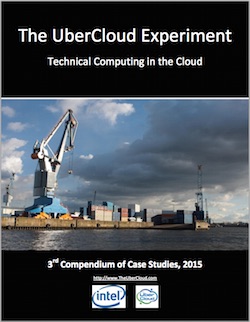 The UberCloud has published their 3rd Compendium of HPC Cloud Case Studies. Like its predecessors in 2013 and 2014, this year’s edition draws from a select group of projects undertaken as part of the UberCloud Experiment. UberCloud is the online community and marketplace where engineers and scientists discover, try, and buy Computing Power as a Service, on demand.
The UberCloud has published their 3rd Compendium of HPC Cloud Case Studies. Like its predecessors in 2013 and 2014, this year’s edition draws from a select group of projects undertaken as part of the UberCloud Experiment. UberCloud is the online community and marketplace where engineers and scientists discover, try, and buy Computing Power as a Service, on demand.
This is about the Democratization of HPC,” said Wolfgang Gentzsch, President of The UberCloud. “The goal of the UberCloud Experiment remains the same – to perform engineering experiments in the cloud with real applications in order to understand the roadblocks to success and how to overcome them. The Compendium is a way of sharing these results with the broader HPC community. Our efforts are paying off. Based on the experience gained over the past several years, we have now increased the success rate of the individual experiments to almost 100%, as compared to 40% in 2013 and 60% in 2014.”
According to Gentzsch, the UberCloud reached an important milestone with the introduction of UberCloud CAE Container technology based on Linux Docker containers. Use of these containers by the teams dramatically improved and shortened experiment times from an average of three months to a few weeks, or, in a number of instances, a few days. Containerization simplifies the access, use and control of HPC resources whether on premise or remotely in the cloud. Essentially users are working with a powerful remote desktop in the cloud that is as easy to use as their regular workstations. They do not need to learn anything about HPC and systems architecture to run their projects. This approach will inevitably lead to the increased use of HPC for daily design and development, even for novice HPC users.
Intel, a major sponsor of the UberCloud experiments, is doing its part to bring about the democratization of HPC. The company has launched many valuable initiatives concerning education and training, code porting, and providing tools for code optimization in technical computing.
We’re excited about the innovations that will come about from the widespread use of HPC by scientists and engineers, but also from emerging workflows and usage models. We look forward to the advances from UberCloud that will help enable the democratization of HPC”, said Maxim Alt, Director Advance Technology Collaborations at the Office of the CTO for Enterprise and High Performance Computing at Intel.
At this year’s ISC Conference in Frankfurt, held in July, Raj Hazra, Intel’s Vice President of the Data Center Group and General Manager of Technical Computing, presented Intel’s vision of a new Scalable System Framework architecture that combines features and functionalities which enable solving HPC, cloud and Big Data problems on the same, configurable system. Container technology will play a major role: application containers can be moved in an out instantaneously, on demand, while automatically providing applications requirements information to the underlying system. This approach will also further the democratization of HPC as low cost, extraordinarily powerful supercomputers with workstation form factors make their way under the desks of engineers and researchers in the enterprise and research laboratories.
The latest round of UberCloud Experiments is well underway and new teams are constantly signing up to participate in future rounds. This is a testimony to the success of the collaborative model we have created – a variation on crowdsourcing that brings the benefits of HPC as a service to an underserved SME population that, until now, had no way to access this transformative, enabling technology. We are extremely grateful for Intel’s continuous support of our UberCloud experiments, and the invaluable case studies they generate, as well as this Compendium series.
Download the UberCloud Compendium of Case Studies * Sign up for our insideHPC Newsletter



